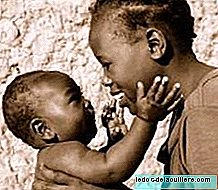
Some time ago we told you that you have to avoid nicotine substitutes during pregnancy, as they could cause congenital malformations in the baby. A new study associates the maternal use of nicotine substitutes with colic in babies.
Specifically, women who use gum, patches or nicotine inhalers during pregnancy are 60% more likely to have a baby with colic than women who do not consume nicotine.
If these nicotine replacement options have been considered a better option than smoking during pregnancy, what is being seen more and more is that it is about options whose consequences are not yet investigated.
The lead author of the study, Dr. Ioanna Milidou, from the Aarhus University Hospital in Skejby, Denmark, explained that with her team she wanted to check if nicotine would increase the risk of colic in babies of smoking women.
The team gathered information from 63,000 women that they had had a baby between 1996 and 2002: 15,000 of them had smoked during pregnancy; About 1200 had used some form of nicotine replacement and had smoked at some time during pregnancy, and 207 women used nicotine replacement therapies only.
The study, published in the journal "Pediatrics," notes that 7% of babies of women who had never used nicotine had colic. In contrast, 9% of the babies of the women who had smoked and 11% of the babies of the nicotine replacement users had colic.
However, the researchers point out that although the rate of colic was higher in babies exposed to nicotine, its results do not prove that the substance is the cause. They also point out that it is necessary to consider other aspects of tobacco replacement therapy that is affecting the health of babies, along with more studies on the effects of nicotine in children.
It is clear that many women smokers have a hard time quitting tobacco during pregnancy (others find it easier), in any case if there are problems in this regard you can request the help of specialists and consider the option of also do not use nicotine substitutes because of the possible risk that it entails for the baby, and on which it seems that there is enough to investigate.












